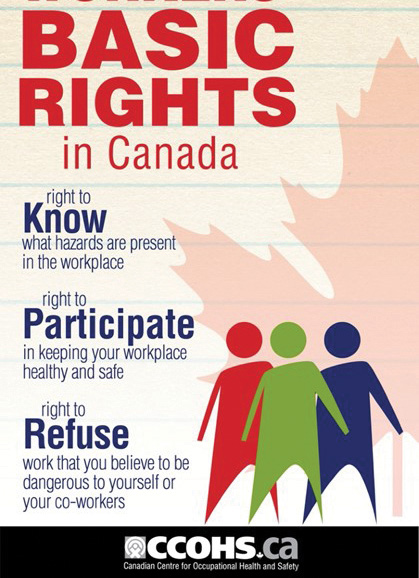Health and Safety – Workers Rights
By Laurel Woodhouse, Health and Safety Manager
As a worker, did you know that you have three important rights? These include:
- The right to know about hazards at work and the right to get information, supervision and instruction to protect your health and safety on the job.
- The right to participate in identifying and solving workplace health and safety problems either through a health and safety representative or a worker member of a joint health and safety committee.
- The right to refuse work that you believe is dangerous to your health and safety or that of any other worker in the workplace.
The Right to Know:
Workers have the right to know about any potential hazards to which they may be exposed in the workplace. The primary way that workers can become aware of hazards in the workplace is to be informed and instructed on how to protect their health and safety, including health and safety related to the use of machinery, equipment, working conditions, processes and hazardous substances.
The employer can enable the worker’s right to know in various ways, such as making sure they get:
- Information about the hazards in the work they are doing
- Training to do the work in a healthy and safe way
- Competent supervision to stay healthy and safe
The Right to Participate:
Workers have the right to be part of the process of identifying and resolving workplace health and safety concerns. This right is expressed through direct worker participation in health and safety in the workplace and/ or through worker membership on joint health and safety committees or through worker health and safety representatives.

Workers have the right to refuse work that they believe is dangerous to either their own health and safety or that of another worker in the workplace. For example, workers may refuse work if they believe their health and safety is endangered by any equipment they are to use or by the physical conditions of the workplace. The worker should explain to their employer why they believe the work is unsafe. Although they cannot not leave the work site, they can ensure they are in a safe place. If the worker and employer disagree, the Safety Worker Representative is called to assist with determining controls. All parties must agree that the work is safe to continue. The jurisdiction of the work will determine how the right to refuse is applied. All jurisdictions in Canada have adopted the philosophy of the Internal Responsibility System (IRS) where everyone in the workplace is responsible for their own safety and for the safety of co-workers. The IRS puts in place an employee-employer partnership in ensuring a safe and disease-free workplace.
